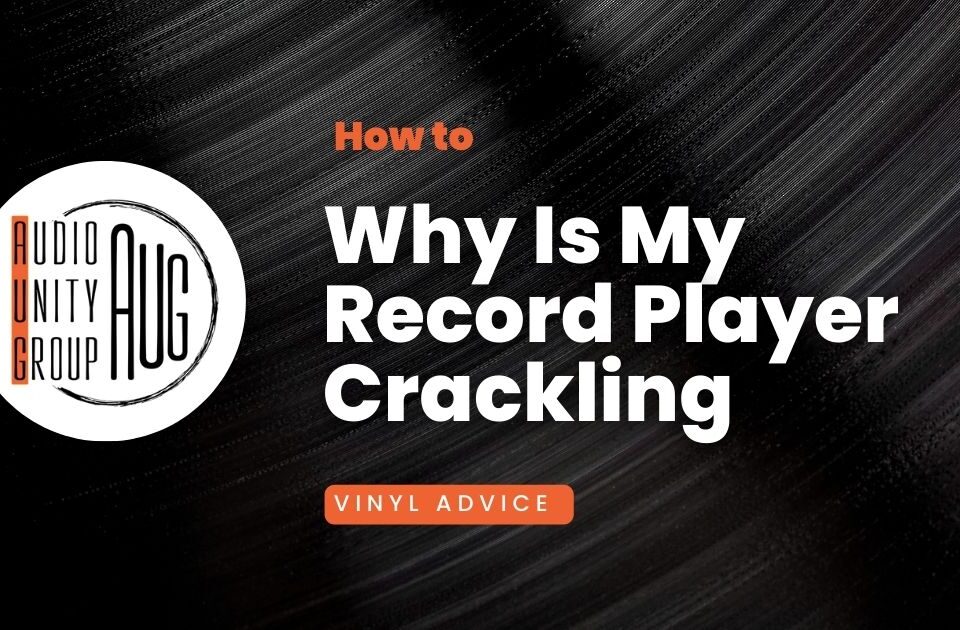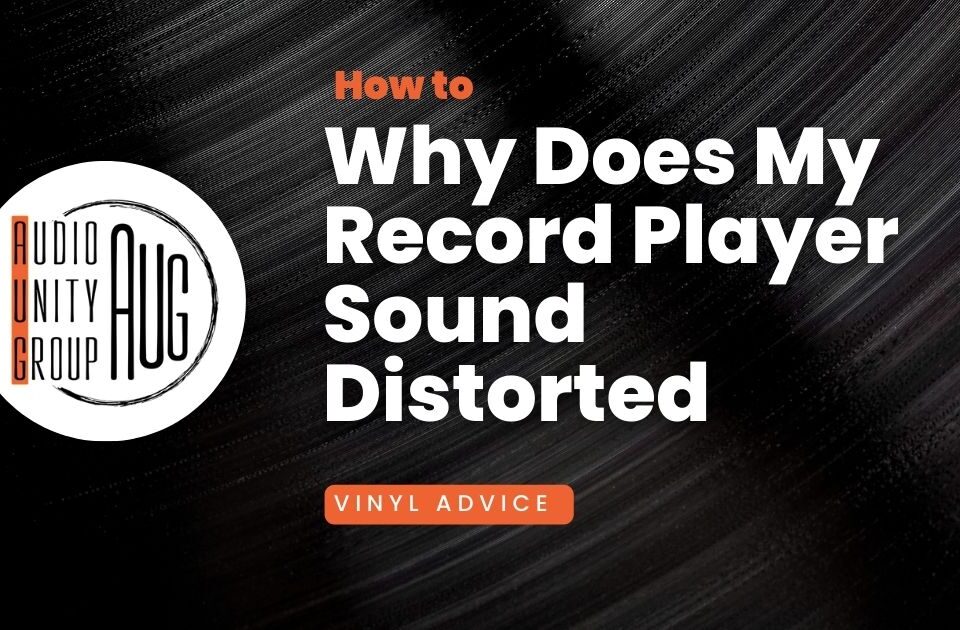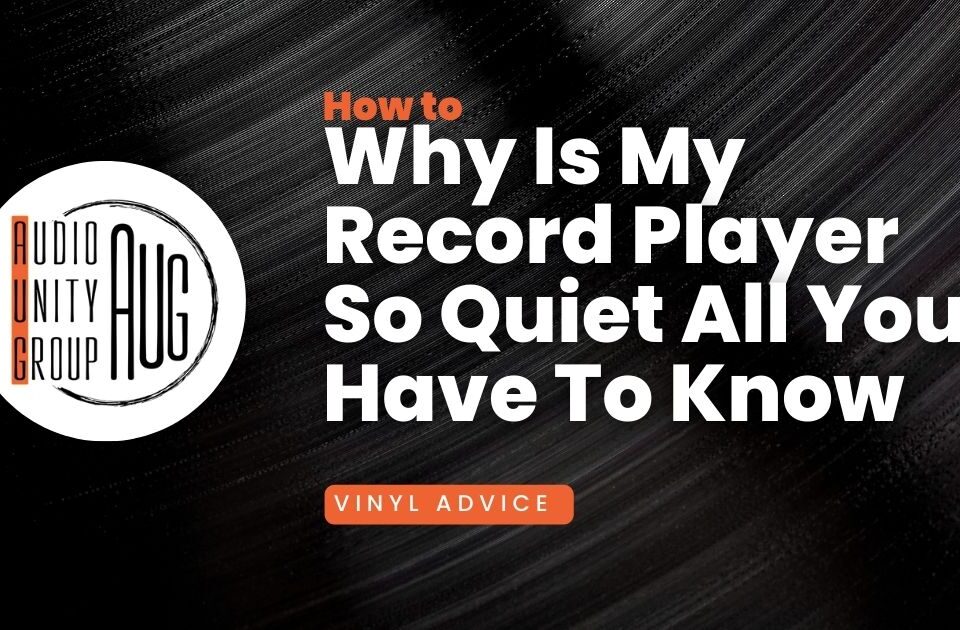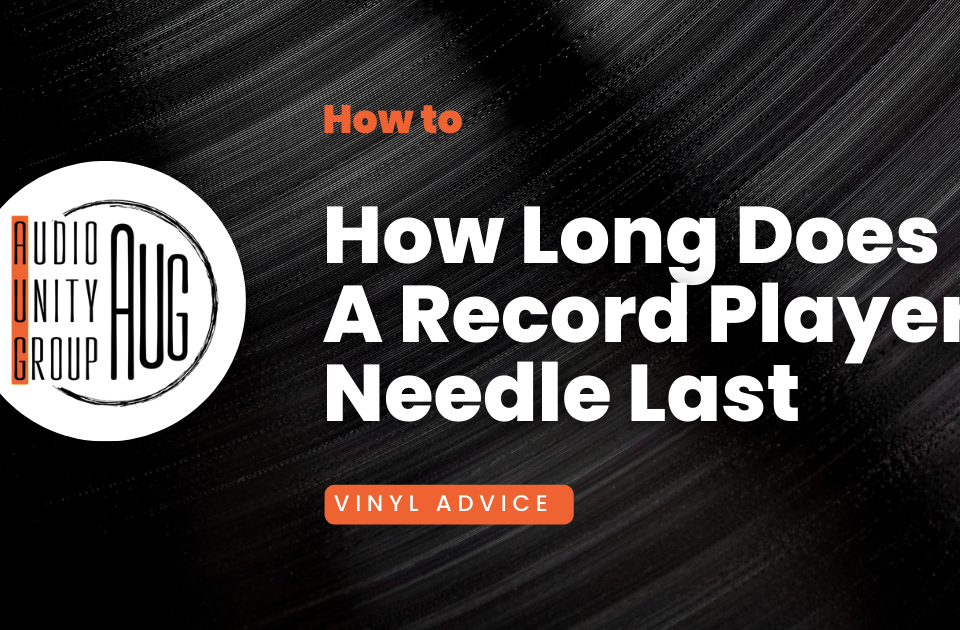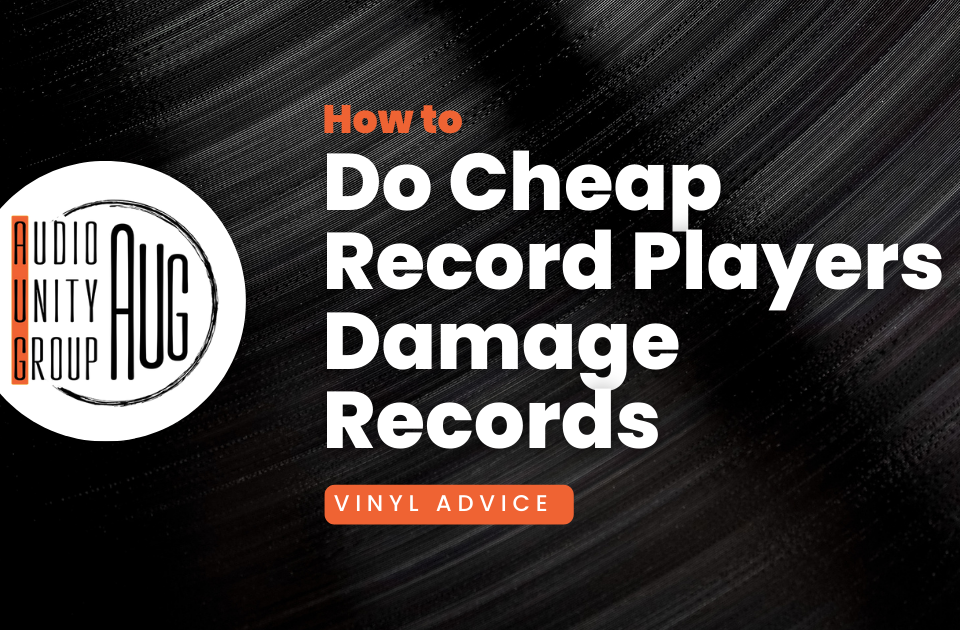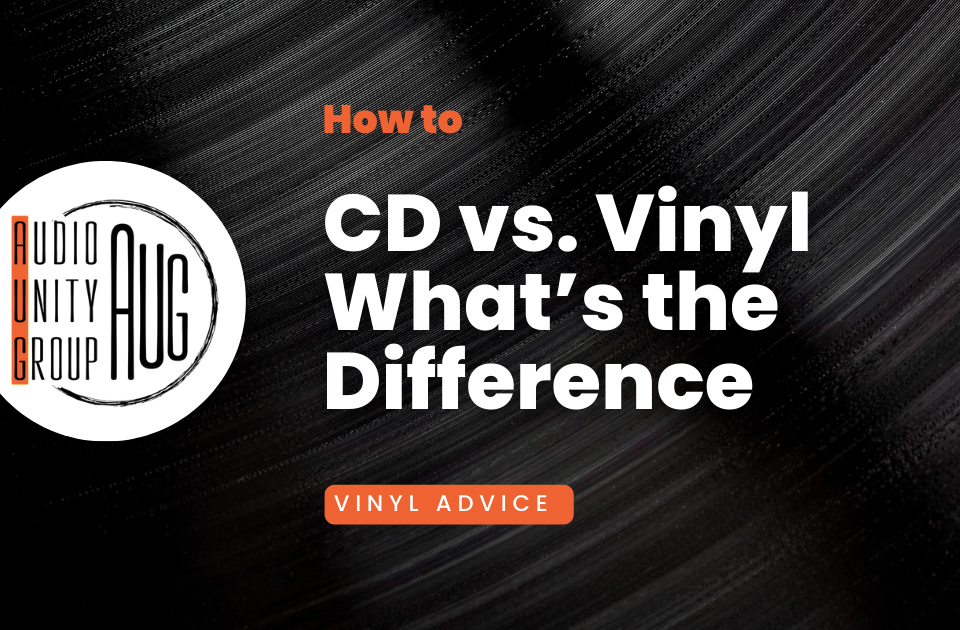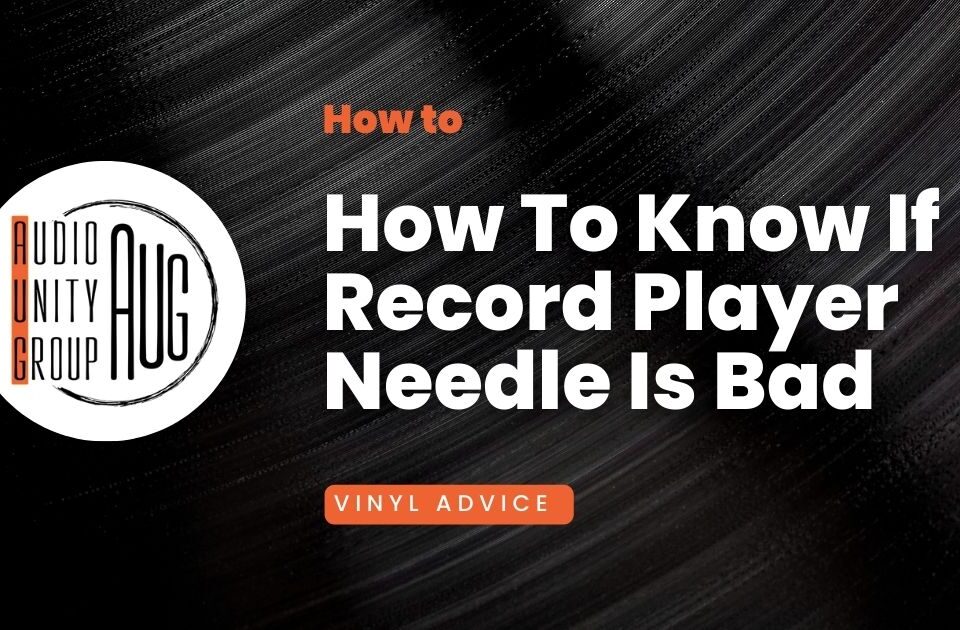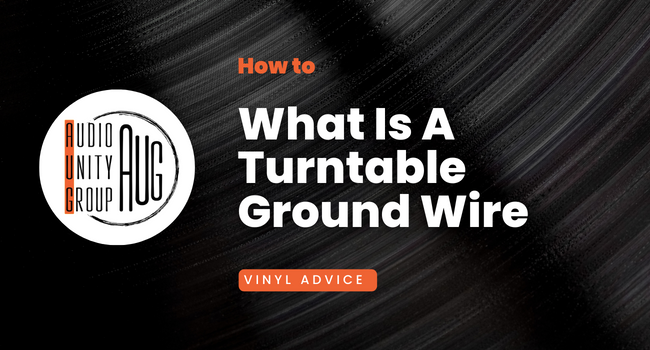
What Is A Turntable Ground Wire: The Guide
April 28, 2023
What Is Turntable Anti-Skating: Vinyl Plant Guide
April 30, 2023Last Updated on June 9, 2023 by Tom S. Ray
How To Clean A Record Needle
Are you a vinyl enthusiast? Are you looking for the perfect sound quality? Then ensuring that your record player’s needle stem is clean is essential!
Cleaning your record needle (also known as the stylus) often can significantly improve playback and sound quality, leading to an enjoyable listening experience.
It’s one of those things amongst Anti-Skating which can be often neglected.
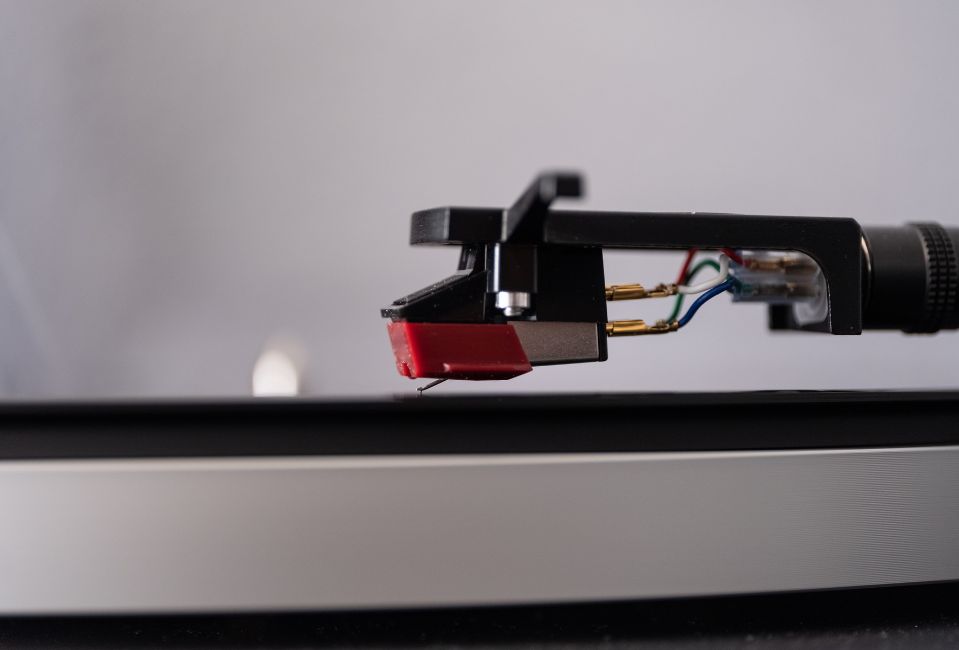
Why It’s Important To Clean Your Record Needle
Cleaning your record needle regularly is essential to ensure the improved sound quality of your music, extending the lifespan of both your records and stylus while preventing skipping and distortion.
Improved Sound Quality
Keeping your turntable needle or stylus clean is essential for enjoying the best possible sound quality from your vinyl to look after both its longevity and audio fidelity.
Dust, dirt, and debris can build up on the record needle over time which causes interference when you play a record.
This leads to unnatural sounding playback with pops, skips, crackles, noise floor distortion – all of which result in an inferior listening experience.
Cleaning helps to ensure that these contaminants are washed away so that audio waves aren’t hindered and streaming frequencies are freed up again.
A regularly cleaned stylus will also reduce damaging wear on records due to unwanted particles entering their grooved surface during spinning playback at high velocities.
Don’t forget to also clean your phono line as this could be an excellent time to do so.
Longer Lifespan Of Your Records
Keeping your records clean and free of dust is essential if you want them to last for a long time.
The dirt and grime that accumulate on vinyl over time can damage both the record itself as well as the turntable stylus, which can lead to permanent damage and decreased sound quality.
Regularly cleaning your records with a soft-bristled brush and specially formulated record cleaning solution or microfibre cloth helps prevent dirt build up, ensure you’re getting optimal sound quality from your stereo setup and prolongs the lifespan of both your vinyl records as well as the needle in your turntable.
It’s important to store all of your vinyl properly so it stays clean longer — always use an anti-static inner sleeve when storing, keep away from direct sunlight, dust-covered areas or extreme changes in temperature.
Avoid touching the tip of needle with bare hands; even small amounts of oils on skin have been known to cause problems over time. Be sure that before playing any record, first give it a thorough cleaning according to manufacturer instructions.
Prevents Skipping And Distortion
Maintaining a clean record needle or stylus is essential for getting the most out of your vinyl music. Poorly maintained needles can cause regular skipping, distortion in sound quality and decreased life span of records.
Dirt, dust and other debris builds up on the tip of the needle as it picks up vibrations from within the record groove during playback.
As this build-up increases, it causes poor contact between the needle and record which interferes with signal pick-up resulting in audio distortion and skipping due to frequent dropouts.
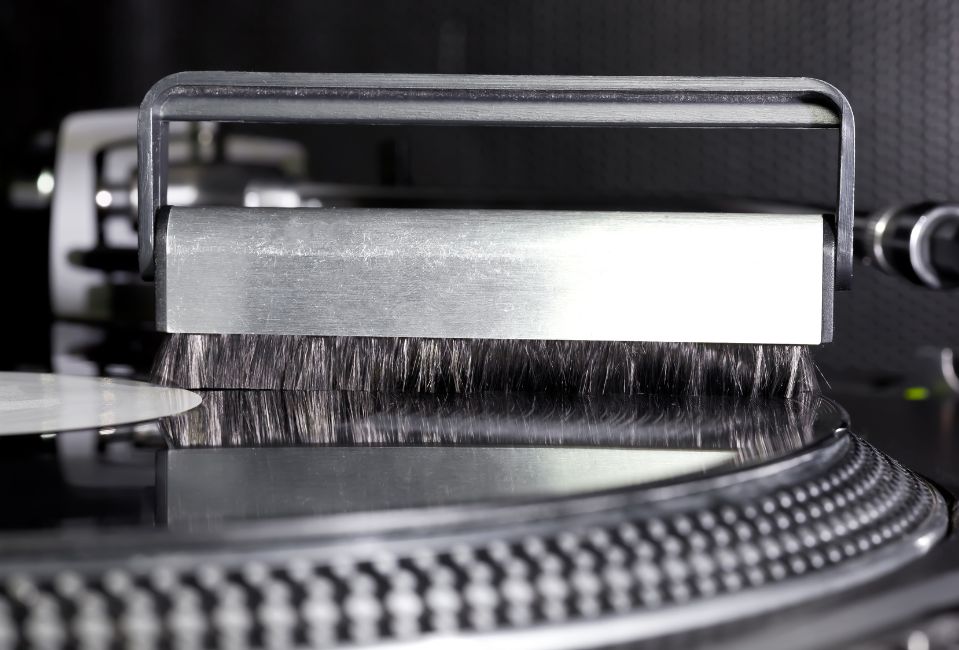
Materials Needed For Cleaning
include a soft-bristled brush, suitable record cleaning solution and a microfibre cloth.
Soft-bristled Brush
A soft-bristled brush is the best tool for cleaning your record needle without damaging it. It’s important to use a gentle pressure and angle in order to avoid any potential damage, so be careful! A stiffer brush can cause scratches or other imperfections in the delicate stylus of your turntable that could lead to unpleasant sound problems or even permanent damage.
The advantage of using a soft-bristled brush is that dust and debris won’t be embedded into the tip–which would happen if you used something abrasive like a toothbrush. This will ensure better playback of audio and improved sound quality with each use.
Record Cleaning Solution
When cleaning your turntable stylus or record needle, it’s important to use the right type of cleaning solution. Record cleaning solutions are specially formulated to remove stubborn dirt and debris without causing any damage.
If used correctly, they can help improve sound quality, as well as extend the lifespan of your records by preventing skipping and distortion. There a few types of cleaning solutions available, such as rubbing alcohol, specifically designed SC1 fluid for deep cleanings and even natural cleaners like soap-based cleansers or vinegar mixtures.
A microfiber cloth or soft bristled brush may be used in conjunction with the liquid cleaner for a more thorough cleanse but should only be done following manufacturer instructions since incorrect use can damage both your records and stylus.
Microfibre Cloth
Microfibre cloths are widely regarded as the best option for cleaning vinyl records. They provide a deeper clean and have soft fibres that won’t damage delicate record grooves when scrubbing back and forth.
Furthermore, microfibre cloths also produce less static than traditional cleaning supplies like brushes or cotton towels, therefore reducing dust attracted to the cleaned surface.
It is important to clean your microfibre cloth regularly and especially after each use – this will help prevent smearing of dirt and grime onto other parts of the record being cleaned.
To ensure optimal results while cleaning an album with a microfiber cloth it is adviseable to use some liquid cleaner first before gently scrubbing in line with the direction of rotation of your turntable’s platter mat.
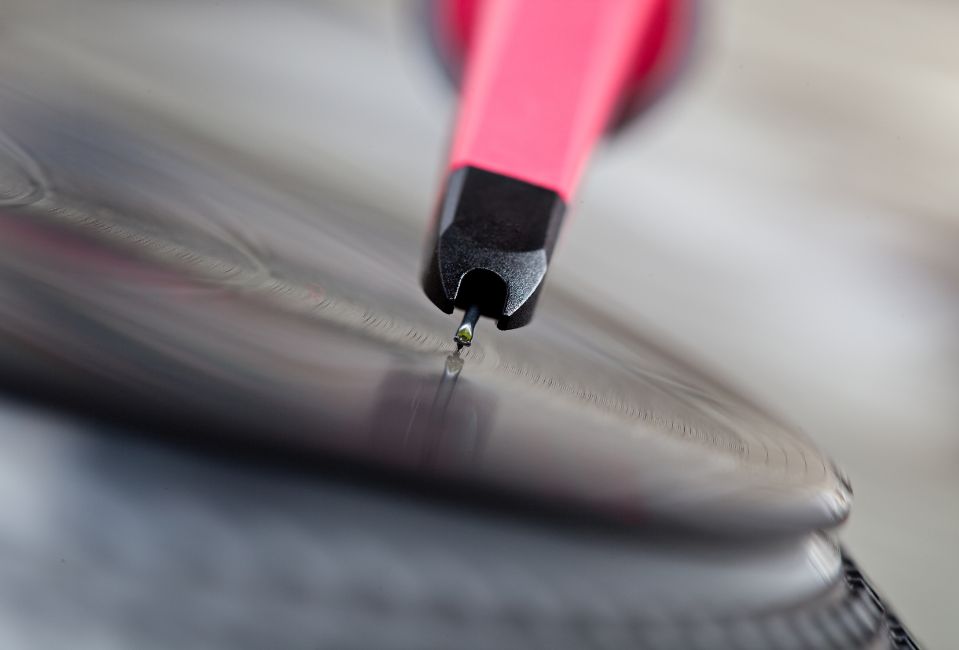
Step-by-Step Guide To Cleaning Your Record Needle
Gently remove any dust and dirt from the needle using a soft-bristled brush, apply record cleaning fluid to the cloth or brush then wipe across the stylus in the same direction as it moves, and allow time for your stylus to air dry afterwards.
Turn Off Your Turntable
To ensure the safety of your needle and turntable it is important that you turn off the power before attempting to clean. This will prevent any accidental damage from occurring by avoiding contact with the spinning motor or platter, which will also protect any other electrical components.
When cleaning, remember that even without the power on, your stylus can still be fragile so extra care should be taken when handling and wiping away excess liquid or dust.
To safely turn off your turntable, unplug it from its socket and wait for all movement to come to a complete stop as this indicates it has been completely turned off. Additionally, use caution when removing dust covers as pressure can often confuse buttons leading them back into an ‘on’ position.
Gently Brush The Needle With A Soft-bristled Brush
Using a soft-bristled brush to clean your record player needle is an essential part of increasing the sound quality, longevity and performance of your records. Record players are delicate instruments and their needles can be easily damaged if not cleaned properly.
A soft-bristled brush is best for cleaning away dirt, dust and lint that collects on the tip of your needle over time as it absorbs these particles without causing wear or tear on its fine edges that store information while playing back records.
It’s also important to use a brush with shorter bristles when brushing in order to ensure that you don’t push debris further into difficult spots where it could potentially cause more damage.
Additionally, move from side-to-side in the same direction as how a record spins (not vertically) – this way any embedded particles can come out easier and won’t stay stuck within the grooves.
Apply Cleaning Solution To The Brush Or Microfibre Cloth
Using a cleaning solution when cleaning your record needle is essential for getting optimal sound quality. Cleaning solutions can help remove dirt, debris and other contaminants that have built up over time on the needle’s stylus tip.
This ensures that the delicate metal of the needle remains free from damage and corrosion which helps to prevent distortion and skipping during playback.
The type of cleaning solution you use depends on what is available to you, ranging from solutions specially designed for vinyl records, alcohol-based solutions or mild detergents with water.
You should be careful not to use abrasive materials as this risks scratching your records or damaging the stylus itself. The solution should always be applied using a soft cloth or brush such as a microfibre cloth.
This will avoid scratching either your needles or the vinyl’s surface while it cleans off dust and grime without affecting its structural integrity too much.
Gently Wipe The Needle With The Cloth Or Brush
It is extremely important to use a soft-bristled brush or microfibre cloth when gently wiping the record needle during the cleaning process as using abrasive materials can potentially damage the needle.
Abrasive materials such as paper towels, cotton swabs and hard bristles can cause scratching and gouging on the surface of the needle tip which could lead to skipping, distortion and poor sound quality.
Microfibre cloths have small fibers that are highly absorbent yet gentle enough to ensure that no scratches are caused. Soft-bristled brushes should also be used as they offer superior debris removal without causing any damage to the delicate stylus tip.
Allow The Needle To Air Dry
After cleaning your record needle, it is important to allow the needle to dry completely. It’s not enough just to wipe it down with a cloth – you must give the stylus adequate time to air dry properly in order for it to work correctly and last longer.
If you’re impatient and don’t let the stylus fully dry before playing, there’s a risk of damage or distortion caused by moisture on the tip of your needle. To ensure that this doesn’t happen, gently blot away any excess wetness from your brush or cloth and leave you stylus out in an open area until it has had plenty of time (at least two hours) undisturbed so that all traces of moisture have evaporated.
For added protection against dust gathering while drying, some turntables come built-in with anti static dust covers which can also help reduce static charge build up when not playing records.

Tips For Maintaining Your Record Needle
– Store your records properly in an upright position as horizontal storage can lead to a build-up of dirt on the surface.
– Avoid touching the needle with your fingers when handling it, and make sure to clean your records before playing them.
– Keep turntables away from dust, moisture, heat sources and direct sunlight exposure as much possible.
Store Your Records Properly
It’s essential for music lovers to store their records properly. Since records are delicate and sensitive, storing them incorrectly can cause damage that may not realize until you play the record on your turntable.
The levels of dust and other particles buildup over time can affect playback performance and sound quality, resulting in scratches or skips when playing a song. To avoid this, using inner and outer sleeves to protect your vinyls is important: inner sleeves made from plastic or special paper will prevent dirt particles from directly touching your disc while outer covers keep dust away.
Make sure to stand your LPs upright rather than horizontally which affects the curvature of the vinyl discs.
When it comes to taking care of 7-inch singles or 45’s they should be stored flat as they’re more prone (than LP albums) to warping due to heat or moisture — this also applies for 12” picture discs so keeping them all flat in a box would help ensure against warping! Additionally, always make sure any type of sleeve does not have any writing on it such as labels, logos etc., since direct contact with ink causes damage over time; if necessary use an additional clean paper slip placed between a label sticker affixed onto the sleeving material itself which comes off easily at a later date if desired! Finally, you should get into good habits like regularly cleaning off each sleeve before returning back its original position within your collection – ensuring there’s no excess lint/dirt transferred onto future records within your stack during usage/playback times – as these could potentially cause issues down the line without proper maintenance practices put into action now!
Avoid Touching The Needle With Your Fingers
It is important to try and not touch your record needle with your fingers as the oils from our hands can damage the delicate tip of the needle or stylus.
When a stylus has been contaminated by these oils, it produces an unwanted sound or static interference when playing back vinyl records.
Keeping your finger away from the needle also prevents dust and other particles from getting stuck on there which can affect sound quality. Record needles should be handled gently during cleaning because they can get worn out quickly otherwise, resulting in poor playback quality or even skipping of tracks.
For example, do not rub or wipe the tip of the styuls when dry-cleaning with a brush – only use soft circular motions without too much pressure so that you don’t wear down your turntable’s stylus prematurely.
Clean Your Records Before Playing Them
It is essential to clean records before playing them in order to maintain the quality of sound and keep your stylus safe.
If a record has dirt, dust particles, or debris lodged between its groove and the needle, it can damage your needle as well as reduce sound quality.
This can be especially risky during playback if there’s an abundance of tiny particles that cannot be seen by the naked eye. For this reason, you should make sure you are actively wiping down or washing each record with a soft cloth or a vinyl cleaning solution prior to popping it on your turntable.
You don’t need much when it comes to equipment—a record cleaning brush (or velvet antistatic vinyl brush), some dish soap and water, and/or vinyl cleaning solutions will do the trick and are relatively affordable.
Cleaning a record not only ensures they all look nice but also reduces static build-up which helps improve overall sound quality while decreasing skipping disturbances due to foreign elements getting caught within the grooves of each album side.
Avoid Exposing Your Turntable To Dust And Moisture
It is important to protect your turntable from dust and moisture to keep the record needle, platter, and motor functioning properly. Dust particles can accumulate on the record player stylus over time, which can cause poor sound quality and distortion.
Moisture seeping into the turntable’s interior can also be detrimental as it could affect its performance or even damage sensitive components such as the motor. To avoid this kind of damage, make sure to cover your turntable with a dust cover whenever not in use.
When necessary, use a low powered canned air duster or vacuum cleaner fitted with an attachment specifically designed for vinyl records when removing built-up dirt between uses.
It’s also essential to take measures during damp seasons like keeping your equipment away from windows that are prone to condensation.
All in All
In closing, we can see that cleaning record needles regularly is important for both beginners and seasoned vinyl collectors. Keeping your needle clean helps to ensure better sound quality for each listening session and also increases the lifespan of records.
It prevents skipping and distortion due to dust or debris buildup on the record itself or on the stylus itself.
Thanks for reading.
Tom
FAQ
How often should you clean a record player needle?
You should clean your record player needle after every time you play a record. Regular cleaning can maintain the sound quality and prolong the life of your record player needle or stylus.
What is the easiest way to clean a record player needle?
One of the easiest ways to clean a record player needle is using a stylus brush to gently remove dust and debris from the tip of the stylus. The brush should be moved in the direction that the record spins to avoid damaging the needle
Can I use a magic eraser to clean my turntable needle?
Yes, a clean magic eraser is an effective cleaning product for cleaning a turntable needle. Gently lower your stylus onto the magic eraser a few times until the tip is clean.
What’s the best cleaning kit to use for maintaining my turntable needle?
There are various cleaning kits available on the market, but look for one that includes a stylus cleaning brush, liquid stylus cleaner, or cleaning gel. These kits are specifically designed to clean a record player needle without causing damage.
Can I use isopropyl alcohol to clean my record player needle?
Yes, you can use a mixture of isopropyl alcohol and distilled water as a cleaning solution. Dip a stylus cleaning brush into the solution and gently brush the needle in the direction that the record spins. Remember to remove any remaining fluid afterwards.
How do I know if my vinyl record player needle needs cleaning?
If you notice a decrease in sound quality, static noise, or skipping, it may be time to clean your needle. A dirty stylus can cause these issues and may even damage your vinyl records over time.
How do I remove the dust from the record player needle without damaging it?
Use a stylus cleaning brush or a record brush to gently remove the dust from the needle. Be sure to follow the direction that the record spins to avoid causing damage to the stylus.
Can cleaning a turntable needle improve sound quality?
Yes, cleaning your turntable needle regularly can help maintain its sound quality. A clean needle ensures proper connection between the stylus and the vinyl record, resulting in enhanced audio reproduction.
What is the difference between a record player needle and a turntable stylus?
The terms “record player needle” and “turntable stylus” are often used interchangeably. They both refer to the small tip that reads the grooves of a vinyl record and transforms them into audible sound.
Can I clean the cartridge of my record player as well?
While cleaning the stylus is essential, it’s also a good idea to clean the cartridge occasionally. Use a soft, lint-free cloth or a small brush to gently remove any dust or debris from the cartridge, but avoid using any cleaning solutions on it.





